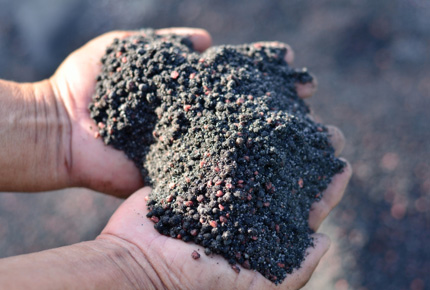Saving the Earth’s endangered resources: treating and reusing phosphorus in Lebanon
Phosphorus, a resource vital for maintaining life, is rapidly disappearing. Dr. Mahmoud Wazne tells us what can be done, and describes his pioneering project in the Qaraoun Lake region.
When it comes to the fear of losing nonrenewable resources, petroleum is the first thing that comes to most people’s minds. Yet, according to Dr. Mahmoud Wazne, associate professor at LAU’s Civil Engineering department, another vital resource — phosphorus — is about to disappear, and sooner than we might think.
“The known global reserves of phosphorus will last us only about 90 more years,” says Wazne. “Phosphorus is literally in our bones and in our DNA. Without phosphorus, the human species will not exist — unless we can adapt in 100 years, which I think is impossible.”
Phosphorus is required by every living cell and is considered to be one of the building blocks of life. It is a crucial ingredient in fertile soil and is thus essential to global food security. In short, our ability to feed ourselves relies on phosphorus.
As agricultural production reaches massive industrial scales to meet global demand, the need for phosphorous fertilizer for high-yielding crop varieties rises. For example, one ton of phosphate – a salt or compound that has phosphorus in it and that is used in fertilizers – is required for every 130 tons of grain. By 2050, as the world population reaches nine billion, food production is expected to rise by 70 percent. The accompanying depletion of the earth’s phosphorus resources has clear catastrophic implications.
Wazne’s work recently has been focused on trying to recover phosphorus, which — paradoxically enough — is also a pollutant. “It’s a scarce resource and yet it’s a pollutant at the same time,” he explains. “Phosphorus attached to fertilized soil ends up in water bodies as a result of soil erosion. It is also found in human waste. My research is focused on the Qaraoun Lake because there is a lot of phosphorus influx into it from eroded fertilizers and untreated wastewater,” he continues. “These act as nutrients that cause algae to bloom. These algae consume lots of oxygen when they die, killing anything that lives off oxygen, such as fish. So it’s a contamination issue.”
In addition to that, “Due to global warming, this green algae has turned into blue-green algae, which is toxic,” the expert says adding that the danger lies in the fact that the Qaraoun Lake and the nearby Litani River are a fresh-water resource for approximately one million people, both for household use and for agriculture. “Since phosphorus is both a pollutant and a scarce resource, why not try to remove it and recover it?” Wazne asks.
According to the expert, phosphorus is absorbed easily into other materials through binding. In the U.S., he worked on a method of recovering phosphorus by binding it to wood. Since wood is not as easily found in Lebanon, he has started looking for other materials that can absorb nutrients such as phosphorus and then serve as fertilizer.
While still at the beginning of his research on nutrient recovery from the Qaraoun Lake Wazne stands poised to make a big difference. After 30 years of scientific and environmental work in U.S., he says that he has “always wanted to come back and make contributions to my home country.” In his view, “We have good laws in Lebanon, but adherence to them is not strong enough. Once we stop organic waste from untreated wastewater discharge, we will have solved 75 percent of the problem.”
More
Latest Stories
- LAU Kicks off the Seventh Season of the Jr. NBA League
- Bridging Policy, Science and Society to Tackle Lebanon’s Environmental Challenges
- Understanding a Core Security Gap in Drone Operations
- LAU’s AKSOB Hosts a Timely Debate on Digital Banking and the Future of Finance
- LAU Study Maps Antibiotic Resistance in Lebanese Wastewater
- LAU Builds New Bridges to Lifelong Learning
- Monitoring Poverty in a Data-Deprived Environment
- Alumna Lynn Nasr (BArch ’25) Shortlisted Among the World’s Top Architecture Graduates


